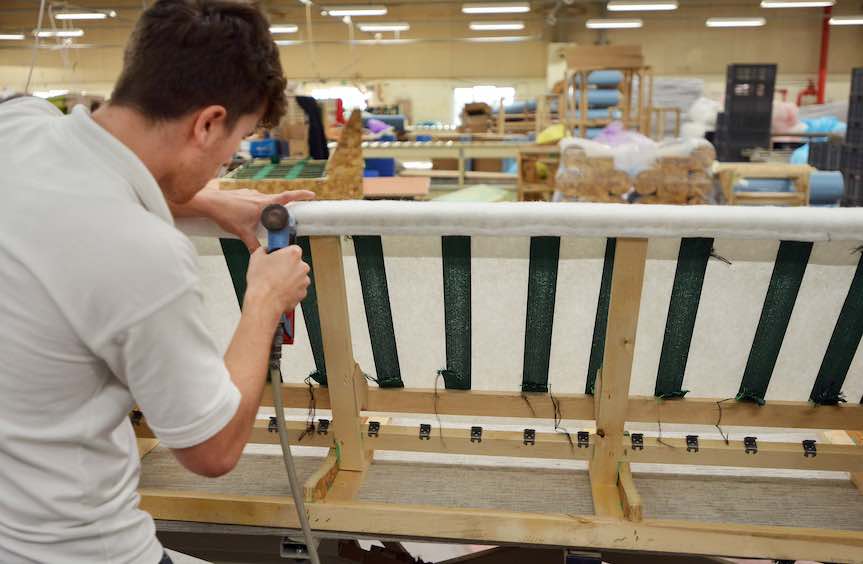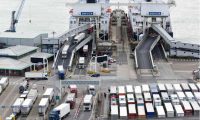
DFS Brexit prep continues as the furniture manufacturer and retailer announces a rise in profits, but warns of a challenging trading environment ahead. Anna Tobin reports
DFS reported its preliminary results today and revealed that its underlying profit before tax, excluding brand amortisation, for the pro-forma 52 weeks to 30 June 2019, are up 31.1% on the 52-week period to 28 July 2018.
The financial report stated, however, that: “The trading environment continues to be challenging, with weak consumer confidence and falls in the number of housing transactions impacting order intake. The outlook for consumer confidence, compounded by the ongoing uncertainty regarding Brexit, has been much talked about in the news media. The Senior Leadership Team has developed comprehensive plans to address any short-term dislocation arising from a no-deal Brexit. It is notable that under WTO rules imported furniture is tariff free, which is helpful, but in the medium term the implications of a sustained drop in the value of Sterling and the consequent inflationary effect for imported products is likely to become a key factor affecting consumer confidence for high value household items. The mitigation of this will be a key focus for our team in the coming year.”
DFS Brexit prep
DFS Brexit prep is concentrating on six key areas where there could be an adverse impact:
Consumer demand
With continuing economic uncertainty impacting consumer confidence, DFS foresee some customers deferring or reducing their spend on new furniture. The report states: “We believe that the underlying growth in our market over 2017 to 2019 has likely been between -1% to -2% per year, whereas a long-term average growth rate for the market is typically over 2%. A 1% change in our sales growth assumption would increase or reduce revenues by c.£10 million, and consequently could have an impact on profits and cash generation of c.£4 million.”
Border delays
Around 60% of finished goods that DFS sells are imported from mainland Europe or China. It forecasts that an increase in lead times could have a direct impact on profit and cash generation in the first financial year that delays occur. The report states: “We have ensured our suppliers each have in place the necessary permissions for accelerated customs clearances and we have also encouraged the use of container routes where customs clearance can take place while ‘on the water.’ Our analysis shows that over 85% of our imports by volume are already taking place using containerised freight forwarders holding Authorised Economic Operator status. We also import raw materials (principally timber and fabric) to manufacture finished goods and we have confirmed that our partner suppliers have increased their UK stockholdings.”
Increased regulatory burden and other friction
DFS is reviewing any impacts on its ability to trade as a result of this.
Tariffs
DFS states: “We do not currently expect to see a material tariff impact, as our finished goods currently largely attract a 0% tariff under WTO terms and our business has experience of operating within the tariff regime for Far East imports. The UK Government has also indicated that they will defer the payment of duty due on all imports from the point of entry to being accounted for as part of companies’ VAT returns, which we believe will give the Group a cash benefit of over £3 million, which will help mitigate the working capital impact of any border delays. Notwithstanding this there may be additional administrative and other cost burdens associated with the chain of custody requirements to avoid tariffs being imposed on raw materials imports, although we do not anticipate these being costly to implement.”
Exchange rates
Changes in the sterling/dollar exchange rate are expected to impact the cost of DFS’s Far East imports. It states: “We hedge our US dollar requirements maintaining cover equivalent to 18 months of spend to give us increased time to respond to any such adverse trends. In the absence of any hedging, each one cent movement in the US dollar exchange rate has approximately a £1 million impact on PBT, prior to any mitigating actions. We anticipate our competitors would pass on any cost increases as a result of foreign exchange movements to the end consumer.”
Staff
Regarding the employment of EU nationals at DFS and within its supply chain, the report states: “At the time of writing, the Government’s position remains unclear as to whether those EU citizens without pre-settled or settled status will be allowed to work in the UK after the 31 October. We see the potential for wage inflation as companies compete to attract workers with appropriate skills and experience. To help mitigate this risk we continue to work hard on our employee engagement to seek to ensure we continue to benefit from employee loyalty, and relatively low turnover.”
The full report can be read here



























































































